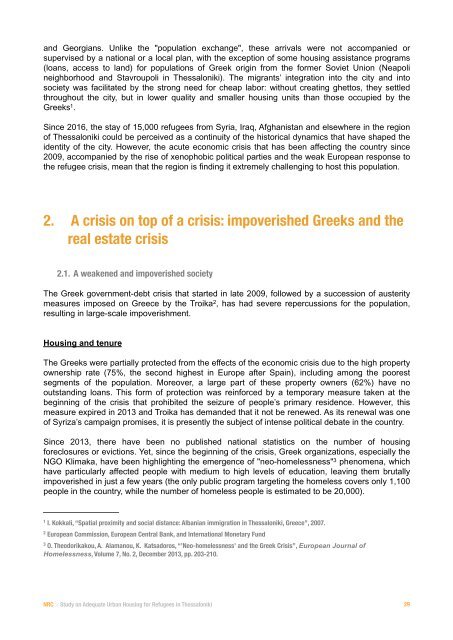STUDY ON ADEQUATE URBAN HOUSING FOR REFUGEES
adequate-housing-study-report-etc-18-11-2016-final
adequate-housing-study-report-etc-18-11-2016-final
Create successful ePaper yourself
Turn your PDF publications into a flip-book with our unique Google optimized e-Paper software.
and Georgians. Unlike the "population exchange", these arrivals were not accompanied or<br />
supervised by a national or a local plan, with the exception of some housing assistance programs<br />
(loans, access to land) for populations of Greek origin from the former Soviet Union (Neapoli<br />
neighborhood and Stavroupoli in Thessaloniki). The migrants’ integration into the city and into<br />
society was facilitated by the strong need for cheap labor: without creating ghettos, they settled<br />
throughout the city, but in lower quality and smaller housing units than those occupied by the<br />
Greeks<br />
1.<br />
Since 2016, the stay of 15,000 refugees from Syria, Iraq, Afghanistan and elsewhere in the region<br />
of Thessaloniki could be perceived as a continuity of the historical dynamics that have shaped the<br />
identity of the city. However, the acute economic crisis that has been affecting the country since<br />
2009, accompanied by the rise of xenophobic political parties and the weak European response to<br />
the refugee crisis, mean that the region is finding it extremely challenging to host this population.<br />
2. A crisis on top of a crisis: impoverished Greeks and the<br />
real estate crisis<br />
2.1. A weakened and impoverished society<br />
The Greek government-debt crisis that started in late 2009, followed by a succession of austerity<br />
measures imposed on Greece by the Troika<br />
2, has had severe repercussions for the population,<br />
resulting in large-scale impoverishment.<br />
Housing and tenure<br />
The Greeks were partially protected from the effects of the economic crisis due to the high property<br />
ownership rate (75%, the second highest in Europe after Spain), including among the poorest<br />
segments of the population. Moreover, a large part of these property owners (62%) have no<br />
outstanding loans. This form of protection was reinforced by a temporary measure taken at the<br />
beginning of the crisis that prohibited the seizure of people’s primary residence. However, this<br />
measure expired in 2013 and Troika has demanded that it not be renewed. As its renewal was one<br />
of Syriza’s campaign promises, it is presently the subject of intense political debate in the country.<br />
Since 2013, there have been no published national statistics on the number of housing<br />
foreclosures or evictions. Yet, since the beginning of the crisis, Greek organizations, especially the<br />
NGO Klimaka, have been highlighting the emergence of "neo-homelessness"<br />
3<br />
phenomena, which<br />
have particularly affected people with medium to high levels of education, leaving them brutally<br />
impoverished in just a few years (the only public program targeting the homeless covers only 1,100<br />
people in the country, while the number of homeless people is estimated to be 20,000).<br />
1<br />
I. Kokkali, “Spatial proximity and social distance: Albanian immigration in Thessaloniki, Greece”, 2007.<br />
2<br />
European Commission, European Central Bank, and International Monetary Fund<br />
3<br />
O. Theodorikakou, A. Alamanou, K. Katsadoros, “’Neo-homelessness’ and the Greek Crisis”, European Journal of<br />
Homelessness, Volume 7, No. 2, December 2013, pp. 203-210.<br />
NRC > Study on Adequate Urban Housing for Refugees in Thessaloniki !29


